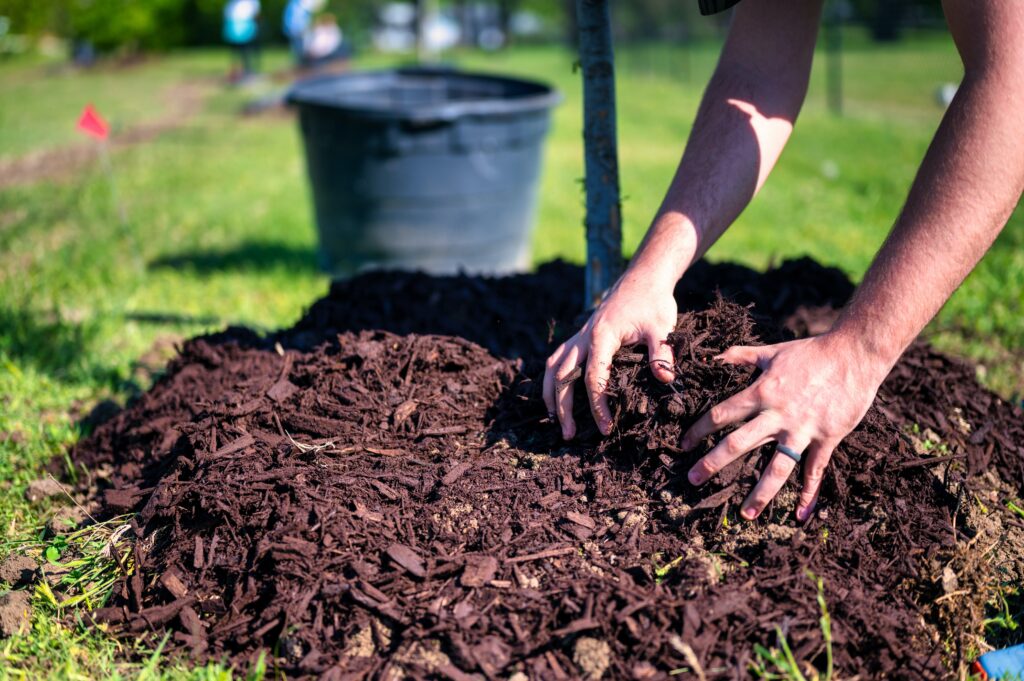Composting is taking advantage of the natural process of breaking-down organic material into nutrient-rich humus. You can mix this humus with your garden, lawn, or flower bed soil to make a fertile base for growing flowers and plants. It’s the ultimate circle of life demonstration. We are taking natural material and breaking it down into its component nitrogen, carbon, and other nutrients that our plants can then use to grow. Nature is efficient, but not always quick. This is why we often get asked “how long does it take to make compost?”
Composting has amazing benefits, including reducing landfill waste (a major source of greenhouse gases), reusing natural material, and reducing the need for artificial fertilizers, which have their own environmental problems.

The Stages of Composting
It might be helpful to start with a quick overview of the major phases of composting. We aren’t trying to make you into a botanist or chemist. The goal here is to give you a quick understanding of why we make some of our recommendations.
Composting relies on natural processes of using organisms and some fancy chemistry to break down organic material. This material could be food scraps, leaves, sticks, paper, wood, or any number of other things that come from natural sources. It’s actually amazing some of the things that you can compost.
The Mesophilic Stage
In this initial stage of composting, your raw materials are still at the environmental temperature. The mesophilic microorganisms start to reproduce. They start the process of breaking down the materials to their carbon and nitrogen components. These microorganisms are happiest about 70-110°F (20-45°C).
The metabolic activity of this stage will raise the temperature to the upper limit of that 70-110°F over the next two to eight days. The production of organic acids also lowers the pH (acidity) of your compost. Things are starting to break down!
The Thermophilic Stage
Now the temperature rises over that 110°F. The thermophilic microorganisms start to takeover. They are happy at this warmer temperature. They can break down the more complex components, like the carbon sources of cellulose and lignin which make up plant walls.
During the thermophilic process, the nitrogen starts to get transformed into ammonia. This raises the pH of the compost, making it more alkaline (the opposite of acidic).
Once your compost pile hits about 140°F (60°C) bacteria grow that are responsible for breaking down waxes, hemicellulose and other complex proteins. This is a big part of the composting process and takes some time.
The thermophilic phase can take several months depending on what raw material you have in the compost pile.
During this phase, it’s critical that you regularly turn your compost. That adds air back into your mixture, spreads out moisture and allows the bacteria to grow and thrive. Otherwise, a different form of bacteria, called anaerobic bacteria, will grow. These are bacteria that thrive in low oxygen environments. This will lead to your compost rotting instead of composting. It will stink, attracting pests and repelling neighbors.
You also want to keep your compost moist enough. You want your humus damp but not weight. It should be the same moistness throughout the entire compost. Turning helps with this too.
As this stage winds down, a pasteurization process occurs. The bacteria die along with harmful microorganisms, provided that your pile gets warm enough. The pile will then begin to cool back to the ambient temperature.
Maturation Phase
In this final phase of composting, there are several secondary reactions that occur that finalize the humus and lead to what we call compost.
These phases will vary a bit depending on how you compost. If you are using a compost pile, these phases are why you may want to consider multiple piles of about 3 feet square each. That way, you can have a stable compost pile in thermophilic phase while you have other piles that you can add compost to. Otherwise, you end up with a pile that is constantly in multiple phases of composting and it may never get as warm (though this can be workable.) A one-pile strategy will take longer to compost.

How Long Does It Take to Make Compost?
Unfortunately, this isn’t an easy question to answer. The answer varies based on the type of compost, the material that you are composting, the outside environment (e.g. it’s tougher for your pile to get warm enough in the winter) and other factors.
If you’re lucky, it may take a matter of days or weeks, more likely, it will take a couple of months. Let’s look at some different types of composting and average times to compost using those strategies.
How Long Does It Take to Make Compost In a Compost Pile?
In this strategy, you use a pile (or multiple piles like we discuss above) for your composting. Composting in a pile will typically take from a few months to compost up to a few years. The difference is largely in how active you are. If you regularly turn your compost, have a good mix of brown and green material and care for your compost pile, it will compost faster.
If you let your pile sit there, it will eventually compost but it will take much longer. With no interaction, you may also get some anaerobic composting which will stink so be careful how and where you do this. Keep it away from the house and close to that nosy, annoying neighbor.

How Long Does It Take to Make Compost In a Compost Bin?
A compost bin follows a similar strategy to a compost pile. The benefit is that a compost bin does a better job of holding in the heat. This makes the composting process more efficient and more consistent. Composting in a bin usually takes two months or so up to about a year to make compost.
Just like with compost piles, you need to be involved for a quicker composting process. You want to turn it regularly and keep it moist.
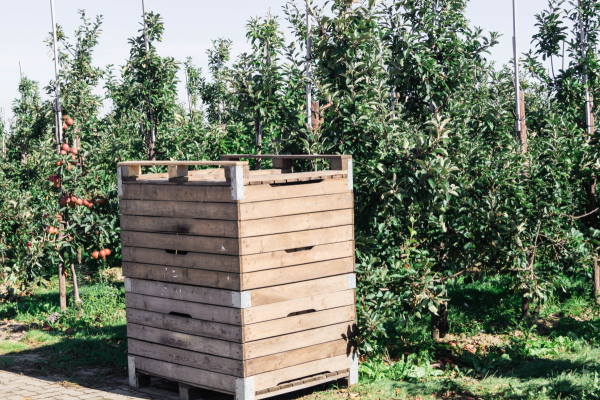
How Long Does It Take to Make Compost In a Tumbler
Tumblers can really improve how long it takes to make compost. They have a couple of benefits over piles and bins. They help to retain the heat and they are very efficient at turning the compost to keep it aerated.
Compost in a tumbler can take under a month.
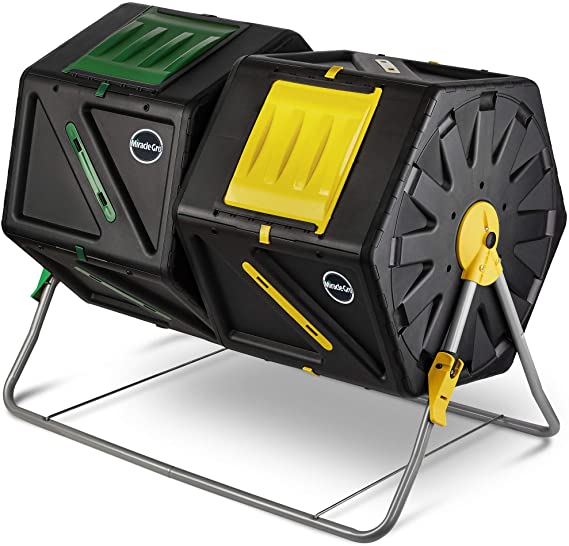
How Long Does It Take to Make Compost Using Vermicomposting (with worms)?
With vermicomposting, you use worms to help you compost. The worms work with the microorganisms to produce compost. Vermicomposting tends to be faster than a bin or pile. It’s not quite as quick as with a tumbler.
Vermicomposting typically takes six weeks to six months depending on the environment. Some of the factors that affect how long it takes to make compost with worms include
- How Many Worms You Have
- Moisture
- How Often You Turn Your Compost Pile
- The Carbon-Nitrogen Ratio
- The environment (the worms don’t compost much in the winter or if it’s too hot outside)
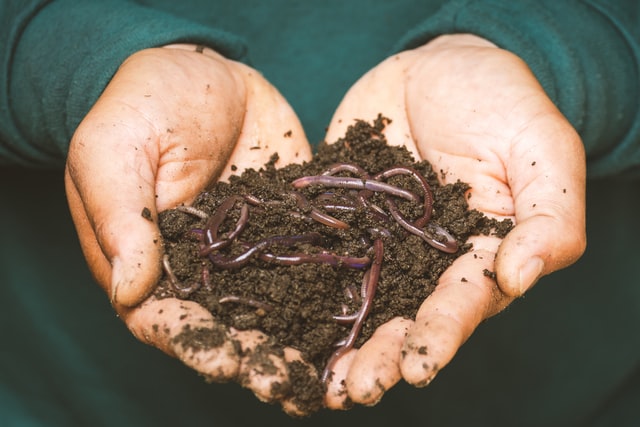
Factors That Affect How Quickly You Can Compost
There are several factors that can affect how quickly you can compost. Maximizing these will help speed up the composting process. Let’s go over the biggest ones. They’re not in any particular order.
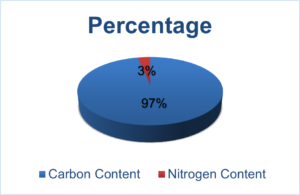
Brown-Green Mix
You want to have the right mix of carbon-rich and nitrogen rich material. (These are also called brown and green material, respectively.) You need the right ratio of these to ensure that you have the right organisms and they can decompose things the way that we are looking for. There are all sorts of fancy math calculators out there, but we don’t want to become botanists. This is a hobby for this. Our suggestion is a sniff-smell test which will get you in the right ballpark pretty easily.
Size Does Matter
Temperature and ratios matter. To get the right temperatures and the right material, you need enough material to get the process working correct.
For a compost pile, bigger is often better to be able to get the right temperature. Despite what we have said before, a bigger pile will often compost faster than multiple small piles. So, if you want to use multiple piles, which can be a good strategy, make sure that your pile is big enough (or your bin is big enough.) You want to have a pile that is at least 3′ (one meter) square and about the same height. Less than that and it won’t compost as well.
You can use about the same volume and size for your bin too.
The Right Amount of Moisture
For proper composting, you need to have the right level of moisture. Too wet and you end up with a mess that your microorganisms have a tough time living in. Two dry and they can’t survive and finish composting.
Compost should be about the consistency of a damp sponge. You shouldn’t be able to wring out water from it by squeezing it and it shouldn’t fall apart like dry soil. You want it to be right in the middle, so damp. Another important aspect of moisturization is ensuring that the moisture is uniform throughout the pile. You don’t want part of the pile dry and part of it moist. Turning your pile regularly and keeping it moisturized will both help here.
Proper Aeration
You want to have aerobic composting. This means that the organisms that grow in your compost use oxygen to do their work (like we do). They live in the middle of a pile and are always using up that oxygen so we have to replace it. Compost that is too dense has no room for oxygen.
This is part of why we turn the compost periodically. Turning is a term for mixing it up and spreading out the material adding oxygen and adding room for oxygen between the pieces of material. You want to turn your compost periodically to ensure proper aeration, a proper mix of material and proper moisturization. It also helps to spread out the heat throughout your compost pile.
Good aeration is key to ensuring the most rapid, thorough compost.
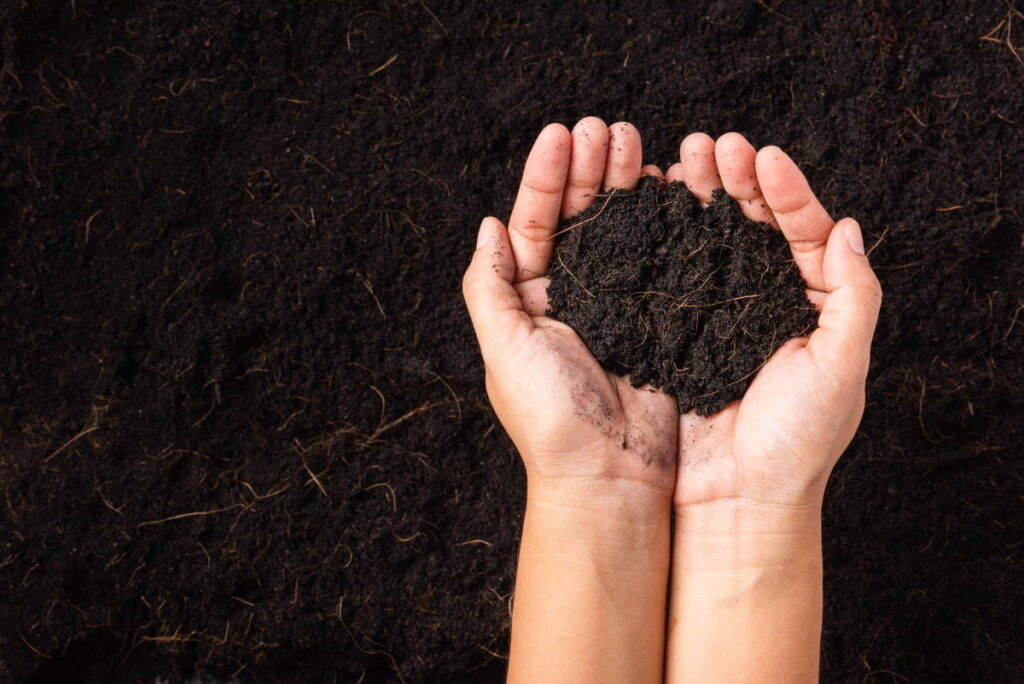
How to Tell If Your Compost is Ready
Okay, so now that we know how long compost takes, how do we know if the compost is ready? Determining if your compost is ready is a bit of a judgement call. Remember, it’s called “black gold” for a reason. That gives you a hint (though it’s often a deep, dark brown color). You want to examine your compost and look for the following traits:
- Color: Your compost should be a deep, dark brown or black color.
- Texture: Your compost should be moist and be a bit crumbly as you move it in your hand
- Smell: Your compost should have an earthy smell, almost like potting soil. If it stinks, something is wrong.
- Temperature: If you are tracking temperature, it should return to the ambient temperature, perhaps a bit cooler.
Will My Compost All Be Ready At the Same Time
Depending on how you compost, your compost likely will not all be ready at the same time. For example, if you are adding material regularly, you’ll have some compost finished while some of the food is still composting. Other material takes longer. If you larger pieces or more durable material, like citrus peels, then they may take a bit longer.
You could wait for everything to finish or you could just use a trowel and a bin and separate out the completed compost from the part that isn’t done yet. This means using a bin or tray and spreading out and removing the parts that aren’t done. You can then add the rest of the compost to your garden or lawn.
Usually, it’s pretty easy to separate out the completed compost from any compost that isn’t done yet.
How Long Does It Take to Make Compost
Composting is not a quick process. It typically takes at leat a matter of weeks, sometimes months. How long it specifically takes depends on a few factors such as
- The Type of Composting That You Are Doing
- How Well You Are Maintaining Your Compost Pile
- What You Are Composting
A well managed compost system will finish much more quickly than a compost pile that you let sit in your backyard. In this article, we have tried to highlight how long does it take to make compost in different systems, ways that you can speed up the process and things to look out for. Hopefully, we’ve helped you be able to better determine how long does it take to make compost.
Have fun composting and finding ways to speed up your own compost.
